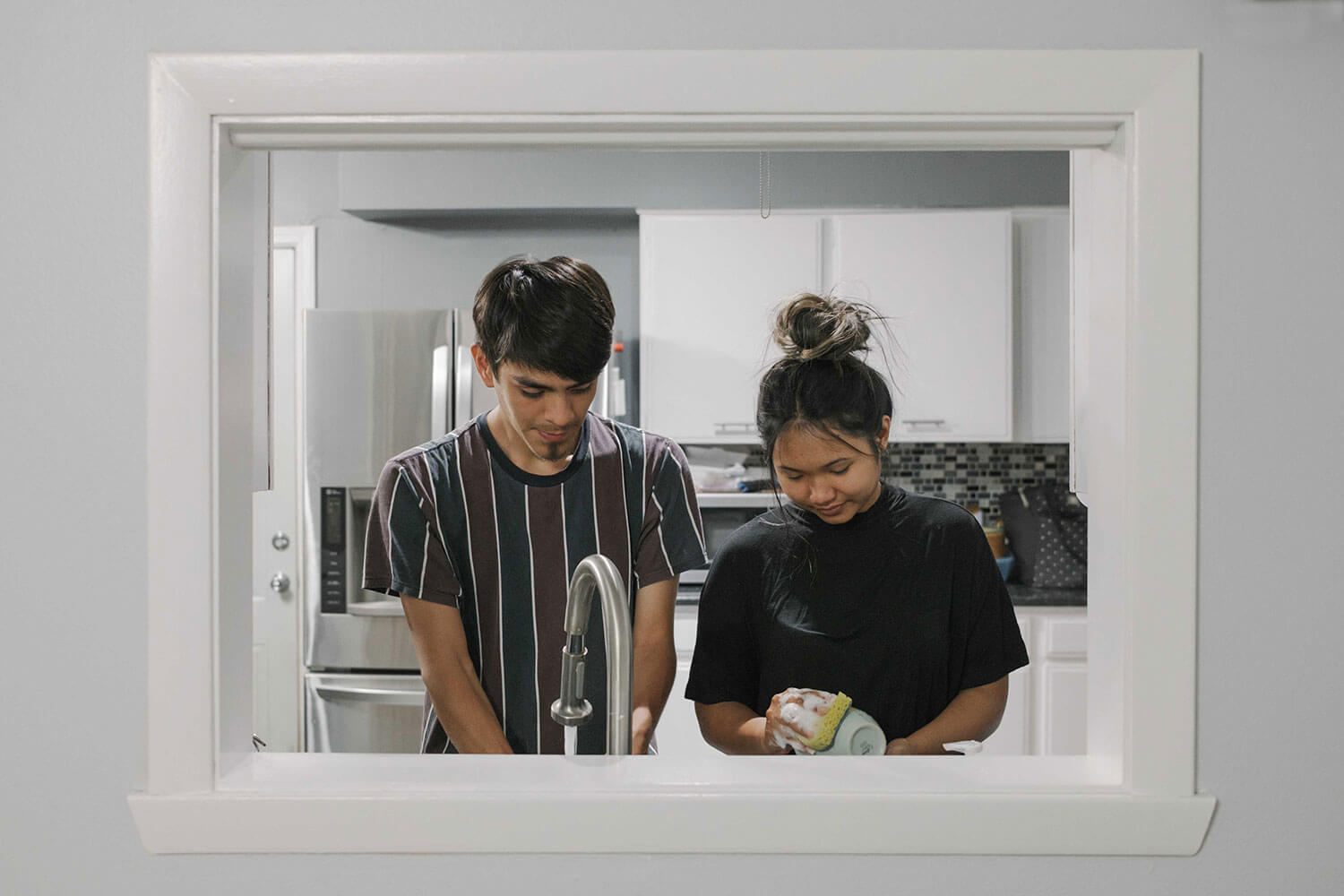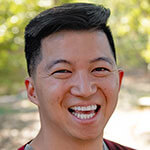
Jessica: When we got married almost seven years ago, I knew it was going to be difficult, but not painfully and dreadfully difficult. At that time, I had been a practicing marriage and family therapist for seven years, and while working on my doctorate, was part of a couples therapy research group studying gender and power. Having seen some of the most heartbreaking and painful seasons of couples’ lives and finding peace with the possibility that I may not find or want to have a lifetime partnership, I was pleasantly surprised to have met my husband, a fellow Taiwanese American, feminist, race-conscious, justice-oriented Christian.
Because I had been studying the role of patriarchy and how gender discourses on male power can hijack relationships and people’s lives, I was surprised; “Wow, an East Asian American man who sees and values me?” Andre had been a math educator at a poverty-impacted school for seven years and engaged in empowering youth, especially girls of color. He deeply loved and respected his late mother. Plus, the church he was raised in ordained women and valued their leadership. I thought we weren’t going to struggle with the same issues around gender and power as I had seen in clients and friends.
Our relationship began with both of us wanting to see and value the other. One of the things I appreciated about Andre from the day we met was his genuine interest and curiosity in my research and career aspirations. We met at a coffee shop and talked about race, gender, power, and social justice. It wasn’t too much for him. I wasn’t too much for him. Over the years, he has consistently valued my career as much as his own and has supported me in pursuing God-given dreams and developing my gifts.

Sometime in our seventh year of marriage, we had a major fight in the midst of an already taxing marital season. Our rhythm was that every night, one of us would give our toddler son, Justus, a bath, and the other parent would clean up the kitchen and come up to say good night to Justus. I don’t know how long this had been happening, but whenever it was Andre’s turn to clean the kitchen, I would go back downstairs after Justus went to bed and find various things still needing to be washed or put away (unwashed pots or kitchen counter with stains and food particles). It felt like extra work for me, and like Andre hadn’t done his job thoroughly. So one night, when he came up to Justus’ room, in my exhaustion and fear of having more work to do, I asked “You cleaned up everything?” I can’t remember what Andre yelled, but his nonverbal communication indicated intense anger. I felt invisible, hurt, and alone.
For some time, I had already been feeling like I was carrying an overwhelming amount of the household and family duties while working full time. I knew Andre was also overwhelmed by things going on in his life, and being acutely aware of this, I tried my best to not add to his plate. This was one of the few times I made a request or need known, and it was denied.
As we reflect on our journey, we both realize that even with our best-intentioned, thoughtful, conscious selves, and while we can be feminists with our minds, the shit hits the fan in our most intimate relationships.
Andre: My education and teaching experience were grounded in liberation, equity, and justice, and I worked relentlessly in the public school space toward these virtues. One of the most difficult things for me to accept and realize was that all this head knowledge I prided myself in went out the window in marriage. My socialization as a man (i.e., toxic masculinity and unconscious beliefs about the role of women in the home) was overpowering everything that I valued. This dissonance made it difficult for me to put my feminist values into practice and caused harm and pain in the household.
Growing up in a Taiwanese immigrant family and being undocumented for some time, I felt less than my other Asian American peers because my family did not always have financial means. Both within and outside my family, I saw that with money came power, and so I developed a mindset of scarcity. I didn’t understand this then, but capitalistic patriarchy fueled my pursuit of “success”, demanding me to compete and to work really hard toward a future where I didn’t have to worry about having a limited amount of resources. Among the three of us brothers in the family, I learned that in relationships, there was always a winner and loser; the right way or wrong way; you were good or bad. There was little gradation, and this also limited my access to a broader range of emotional awareness and language.
Jessica: Whether because of Andre’s socialization or his personality/preferences (probably both), I felt like I was frequently adapting to him — doing or not doing things to prevent him from being irritated, reduce his stress, and keep him in a good mood. I’m still processing to acknowledge that his mercurial temperament is perhaps a response to a hyper-reactive amygdala, a result of his male-dominant context and socialization. My pleaser tendencies are a product of my own family-of-origin background, personality, and socialization as a Taiwanese American female in my particular context. The interactions of our intersecting contexts and personalities led me to feel alone, exhausted, and overwhelmed by the immense burden of invisible labor.
It seemed like Andre did not know how to be aware of or manage his emotional state, so unknowingly, that had become my role. This is a classic representation of our socialization toward femininity and masculinity. In my identification with more feminine ways of being, I learned or was expected to be aware of others’ emotions, particularly of the men in my life. In my family, everyone navigated around my dad’s emotional state, while in church, women carried out tasks in response to male leadership — all without expressing (or perhaps strongly subduing) their needs, desires, and interests.
I felt major discomfort in identifying what I needed and how to ask for it. This has been an ongoing area of growth for me.

Andre: For years, I worked hard as a middle school math teacher leader. After a long and exhausting day or week at work, when Jessica made requests of me for support in the house, I found myself angry, triggered, and reactive. I didn’t like how frequently this was happening and the way it was hurting Jessica. We talked about shifting our focus from the couples therapy we had been attending to more emphasis on my own individual work. Through the support of therapy, I realized when I felt like I wasn’t good enough or pulling my weight, these emotions led to me to feel bitter toward her. Instead of being able to see Jessica’s needs and requests as valid, I saw them as a threat to my high-achieving identity and sense of self. I was also learning about dynamics in my own family-of-origin as well as the unresolved grief I had been living with around my mother’s death from cancer.
I am able to see how I have such little bandwidth at home because I’m constantly working — chasing after the future (for career, for family) in the present. This takes up so much of my energy that it leaves little for parenting, marriage, household tasks, or even my own well-being. This is hard for me to admit, but deep down inside somewhere, I know that someone is going to bail me out, and that someone inevitably is Jessica. It makes me feel weak to say this, but I had prioritized my research, teaching, and parenting ahead of my marriage. This realization has made a world of difference in my relationship with work and family.
The emotional experience I have with male privilege — feeling my own rage, guilt, and fragility — reminds me of the experience I have as a person of color with white people. When good-intentioned white people are faced with their privilege and how they have and can hurt people of color, oftentimes rage, guilt, and fragility surface. I have to learn how to deal with these intense emotions instead of spilling them onto Jessica. They are mine to work through. I can no longer be selective about my feminism, applying it only where it works for me.
Jessica: Sometimes, the way power is negotiated in social justice spaces looks like this: those with more societal power (male, white, wealthy, heterosexual, cisgender, etc.) need to relinquish power, and those with less seek to gain more. The misconception is that there is a limited amount of power to share, and so it pits groups against one another. With this mentality, I find it hard to be empathic toward Andre’s experience because of my own hurt and the expectation I have of him to go figure out his male privilege. For me, this leads to an endless cycle of bitterness and resentment.
While power, privilege, and oppression are part of our social reality. I think it harms us all intimately, especially in our relationships. This is where Christian encouragement to consider that which is praiseworthy, noble, and good is necessary. From the day we met, I knew Andre was someone who was open to learning, growing, and taking a hard look at himself. Even though it’s a challenge for me to do, I have to see the growth we’ve experienced (i.e., through supportive community, individual therapy and couples therapy) and the hard work Andre has put in, even as we hope for more together. This is not to negate the valid anger and deep disappointment I often feel. Recognizing positive changes can exist while also feeling defeated at times. I hope our Asian American contexts continue to give more space for women to feel and express our anger and pain.
I’ve started to wonder if this is part of the sanctification work we do while we’re here on earth. Celebrating the wins toward authentic mutuality while acknowledging where transformation is still needed and partnering together to pursue it.
Andre: So much of how I’ve seen the world has been black and white. Being with Jessica has added multiple colors to my crayon box. There is depth and richness. Feelings are neither good nor bad — they simply are part of our human experience. As an East Asian male Christian, there are not a lot of blueprints to see, feel, or think differently. I have needed therapy — my own and couples therapy peer mentors — along the way, and other couples to journey with us. We’ve shown up at our couples small group in the middle of a fight and tried to be honest with them instead of hiding our marital stress. Reaching out and connecting with others enduring similar challenges has given us encouragement and perseverance for the long journey ahead.
Both: A large part of our joy this season is parenting our 2 1/2-year-old son Justus together. We understand how much the context we create for Justus shapes the person he is and will grow into. Parenting is like a window into ourselves. We hope that our egos become less fragile, our capacity for owning our own feelings and thoughts increases, and the time we need to recover after hurting one another decreases. In our heart of hearts, we believe that in marriage, there is no winner or loser; it is not about what’s right or wrong. Marriage doesn’t have to be a zero-sum game because we are on the same team.
Andre introduced this phrase into our relationship early on: “If it’s important to you, it’s important to me.” We hope to keep upholding this as a value we live toward. Along the way, there will continue to be challenges of day-to-day family and work stress, seasons of high or low mental well-being, and the persistent wrestling with patriarchy. It seems worthwhile though to love our closest neighbor as ourselves and to submit to one another out of reverence for Christ.
Resources we’ve found helpful:

Jessica L. ChenFeng, PhD, LMFT, is Associate Professor of Medical Education and Associate Director of Physician Vitality at Loma Linda University Health, and an AAMFT Approved Supervisor. Her research, writing, and clinical work centers around sociocontextual issues such as gender and power, Asian American identity, and Christian spirituality. Most recently, she co-authored the book, "Finding Your Voice as a Beginning Marriage and Family Therapist". Jessica identifies as a second-generation Taiwanese American liberative educator and lives in Montclair, California, with her husband, their young toddler, and miniature Schnauzer. She loves trees, sourdough bread baking, learning how to sew her own clothes, connecting over coffee, and lightly sweetened jasmine milk tea.

Andre ChenFeng is an advocate for liberation-based healing in education. He is a Ph.D. student at Claremont Graduate University, with a research focus on the integration of empathy and equity in higher education, specifically, how contemplative practices coupled with a racial justice approach can impact teacher wellbeing. He is also an adjunct faculty member at Claremont Graduate University in the Teacher Education Program. Andre received his B.A and M.Ed. from UCLA. He taught 7th and 8th-grade mathematics for eight years at the UCLA Community School in Los Angeles. In his spare time, he watches "This Is Us" with his wife and enjoys reading picture books with his 2.5-year-old son.

Christopher Drinkard is a photographer based out of Minnesota, where he resides with his wife and two children. His work includes wedding and lifestyle photography but he also finds great passion in documenting the world around him through street photography. When he is not with family or busy with a camera, Christopher can be found at his church where he has served as the Worship Leader since 2013. He also loves frequenting local coffee shops, creating music, and teaching. You can see some of his work on Instagram @christopherdrinkardphoto.